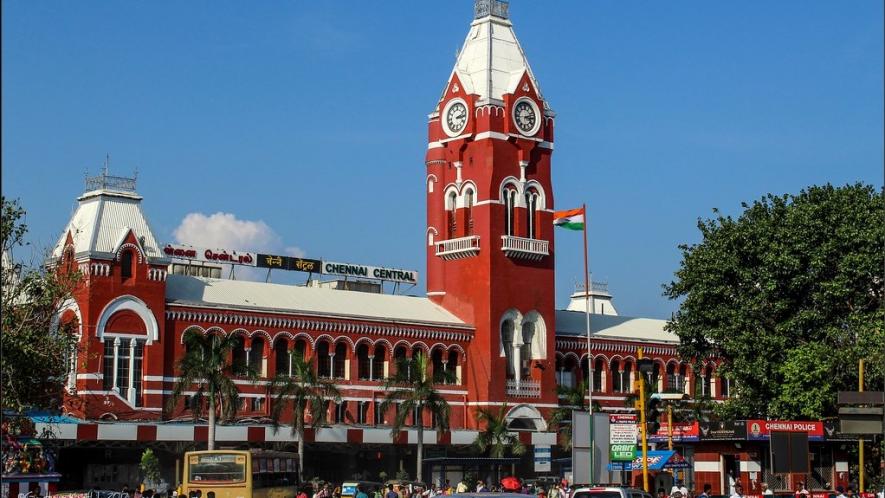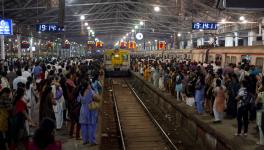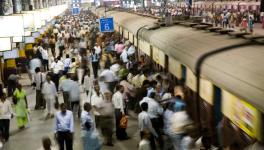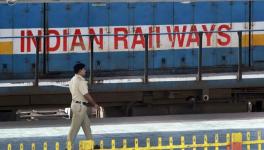36 Key Railway Stations Fail on Green Norms Despite ISO Tag

Chennai Railway Station. | Image Courtesy: Flicker
New Delhi: Despite the massive thrust on sanitation by the Bharatiya Janata Party (BJP)-led Central government over the past six years through the Swachh Bharat Abhiyaan, railway stations continue to spread environmental pollution in the absence of proper safeguards.
A report by the Central Pollution Control Board (CPCB) has highlighted several lapses at 36 major railway stations across the country as far as safeguard of environmental norms are concerned.
The CPCB, which had conducted the assessment of the railway stations on the directions of the National Green Tribunal (NGT), submitted its report to it on July 13. The lapses have come into light despite the fact that all the 36 stations have obtained ISO 14001 certification, an international standard that specifies requirements for an effective environmental management system.
As per the report, sewage treatment plants are yet to be provided in 20 railway stations, which include Delhi, Mumbai, Chennai, Varanasi and Lucknow. These 20 stations are amongst the busiest in the country with cumulative footfalls hovering in the range of millions.
Effluent treatment plants have not been provided at 13 railway stations, which implies that waste (or toxic) water is being released into drains without being treated. These stations include Chennai, Agra, Vijayawada, Vizianagaram, Vadodara and Mumbai.
All 36 railway stations that were assessed have already outsourced their solid waste management activities to other agencies. However, the report highlights that 10 of these contracts fall short of the adequate quantity of solid waste generated at the respective railway stations.
Furthermore, the contracts of several railway stations do not contain the provision for waste segregation and processing. It was also found that nine of these 36 stations do not transport dry and wet waste separately.
Fourteen of the stations assessed are yet to make an assessment of plastic present in the amount of solid waste generated within their premises daily. Prayagraj (Allahabad) in Uttar Pradesh has stood out in the report as the only railway station for failing to impose a ban on single-use plastic despite Prime Minister Narendra Modi having announced in his Independence Day address last year that a ban on the substance will come into effect from October 2, 2019.
Noise pollution was found to be exceeding the maximum permissible levels in all 36 stations. Seven stations are yet to tie up with their respective urban local bodies for prohibition of open defecation – conspicuous along railway tracks in cities – which is again a pet project of the Central government.
The order for conducting this assessment had been issued by the Principal Bench of the tribunal in December 2019 while hearing a petition about issues of managing solid waste, plastic waste, effluents, waste water and sewage in railway stations as well as in trains and its compartments.
During the course of several hearings of this case, the Railways had taken a stand that since its activities are handled by various departments with separate establishments and administration, it is not required to obtain consent from the government under the Water Act, the Air Act or the Hazardous Materials Act.
The bench, headed by tribunal chairperson Adarsh Kumar Goel, had found the stand of the Railways as untenable.
“It is difficult to accept that activities of railway establishments at major railway stations having potential of causing pollution are beyond the environmental laws of the land,” the bench had stated in its December order.
As per experts, budgetary allocations for ensuring sanitation and cleanliness in Railways need to be increased in the light of greater stringencies. In 2019-20, the budgetary estimate was approximately Rs 1.60 lakh crore for capital expenditure in the Railways. The revised expenditure for 2019-20 stood at Rs 1.56 lakh crore. A sum of Rs 3,422.57crore was allocated for passenger amenities from this amount, which came down to Rs 1,881.39 crore in the revised estimates.
For 2020-21, the Central government has made budgetary estimates of Rs 1.61 lakh crore for expenditure on the Railways. A sum of Rs 2,725.63 crore has been allocated for passenger amenities.
“It is a fact that multiple agencies handle sanitation in the Railways. But to co-ordinate these agencies is again the task of the Railways because the premises belong to it. It is also a fact that with environmental norms having become stringent over the years, the budgetary allocation for sanitation and cleanliness in the Railways should be increased in a commensurate manner,” said Sudhansu Mani, a former official of the Indian Railway Service of Mechanical Engineers (IRSME).
The lapses have come to the fore despite the Central government issuing special guidelines for cleanliness of the railways.
In 2017, the Union Ministry of Housing and Urban Affairs had issued a set of Standard Operating Procedures (SOPs) aimed at improving cleanliness in railway stations and to provide a healthy atmosphere to passengers, vendors and railway staff. The SOPs, compiled in a document titled ‘Swachh Railway Stations’, had been formulated keeping in mind Prime Minister Modi’s target of achieving Swachh Bharat by October 2, 2019.
“This SOP targets to ensure proper waste management through recycling and processing of waste, and establish systems in the railway stations for cleanliness. It lays emphasis on the fact that the management of waste at the railway stations (on the railway track, as well as on the platform) requires increased attention and diligence to avoid the exposure to infectious agents and toxic substances,” the document stated.
The guidelines include periodic inspections and assessments apart from setting up of infrastructure and adoption of best practices.
“It is important that all aspects of cleaning and sanitation provision are aligned with the Swachh Bharat Mission Guidelines and other relevant environment-related guidelines issued by the Government of India,” it further stated.
The Swachh Rail, Swachh Bharat report for the year 2019 had ranked 720 railway stations across the country on the basis of various cleanliness indices. Only 2% of the non-suburban railway stations surveyed had scored above 90% in the overall cleanliness score. None of the suburban railway stations scored above 80% in the survey.
As per reports, the Railway Ministry has begun experimenting with installation of vacuum bio-toilets in coaches following the failure of conventional bio-toilets to produce desired results. A report by the Comptroller & Auditor General of India in December 2017 had highlighted that there were nearly two lakh complaints about malfunctioning bio-toilets. However, as of June 2020, the Railways claimed to have installed bio-toilets in 68,800 passenger coaches across all zones of the country.
“Till the time bio-toilets begin to produce desired results, railway tracks within station premises will continue to be soiled and will require human interference. Alternative mechanisms need to be thought out by the Railways until then,” said HP Mishra of National Campaign for the Dignity and Rights of Sewage and Allied Workers.
The writer is an independent journalist.
Get the latest reports & analysis with people's perspective on Protests, movements & deep analytical videos, discussions of the current affairs in your Telegram app. Subscribe to NewsClick's Telegram channel & get Real-Time updates on stories, as they get published on our website.
























